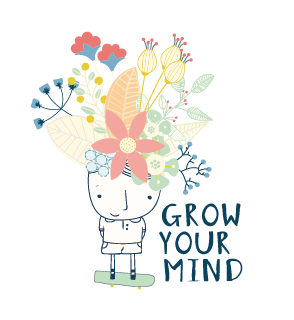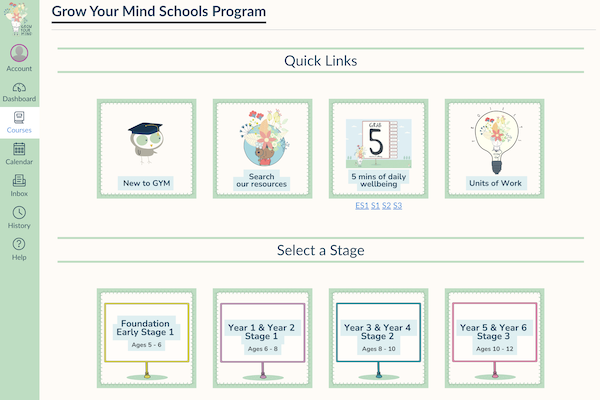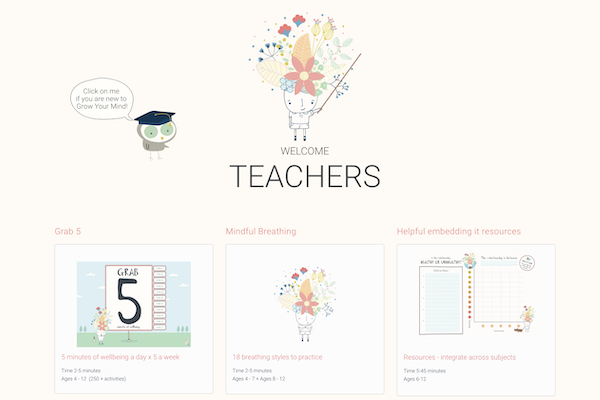A recent Guardian article suggesting we stop teaching mental health lessons in schools certainly hit a nerve. It is not the first time someone has asked if wellbeing programs belong in the curriculum, and it will not be the last. The article written by Lucy Foulkes, titled Mental-health lessons in schools, sounds like a great idea. The trouble is, they don’t work (May 20, 2025), which sparked an important discussion. You can read it here.
First up: what are mental health lessons, really?
Foulkes warned against CBT, mindfulness and Dialectical Behaviour Therapy in a school context. However, if we limit the definition of mental health lessons to these isolated interventions, we miss the full picture and risk throwing the baby out with the bathwater.
At Grow Your Mind, we define mental health lessons as the intentional teaching of social, emotional, and relational skills that lay the foundation for lifelong wellbeing. We teach children how to make and keep good friends, one of the strongest known protective factors against poor mental health. We help them recognise and name emotions, understand their stress response, and learn how to make safe choices when they are overwhelmed.
We provide content to teachers that reiterates that resilience is not about pretending everything is fine and going it alone. Instead it is about seeking support, understanding helpful and unhelpful coping skills and allowing yourself to feel whatever it is you are feeling. We explore what it means to help others and to develop a benefit mindset, because having purpose and contributing to others boosts our own mental health. And we remind students that having just one reliable, safe adult in your life can make all the difference.
These are not just nice-to-have skills. They are essential tools for navigating life with courage, compassion and resilience. To say mental health lessons “do not work” without recognising the power of these protective skills is not only shortsighted, it is dangerous. The 2025 National Suicide Prevention Strategy supports mental health programs being taught in schools:

Building protective factors for lifelong mental health
Mental health lessons at Grow Your Mind are more than a series of points, but time is precious and we want you to get the main idea. Everything we have created is designed to strengthen protective factors that support wellbeing and reduce the risk of poor mental health outcomes. Here is how:
- Brain awareness: Students learn about five key parts of their brain using playful animal analogies and storytelling. They come to understand the science of their stress response, the importance of perseverance, movement, rest, and more. When children know how their brain works, they are better equipped to work with it.
- Friendship and belonging: Knowing how to make and keep a good friend is one of the strongest protective factors for mental health. We teach that being human is messy, relationships take work, and learning to repair is part of the journey.
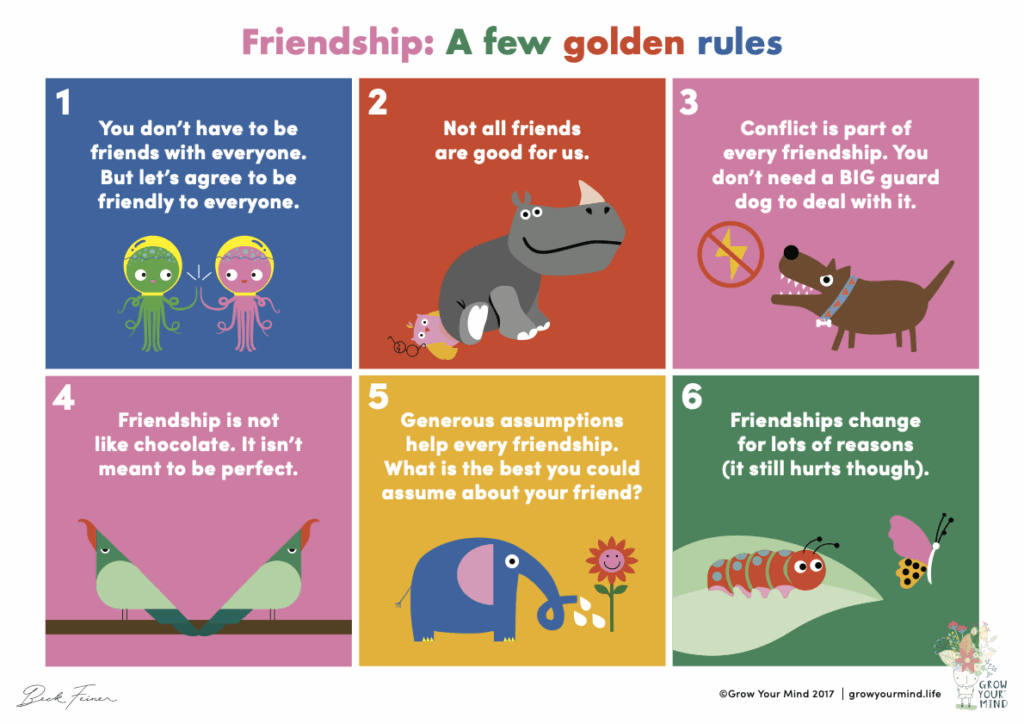
- Character strengths: Children are guided to recognise what is strong in themselves and others. This is not about inflated self-esteem, but about building genuine confidence and knowing which inner strengths to call on in tough moments.

- Seeking joy and other positive emotions: Prioritising joy and daily positive emotions protects mental health. This is not toxic positivity. It reflects Barbara Fredrickson’s Broaden and Build Theory: positive emotions expand thinking, build resilience, and strengthen relationships. Teaching students to notice and savour joyful moments builds long-term emotional flexibility.

- Benefit Mindset: We support children to see how they can use their growth and strengths to help others at school, at home and for the planet. Feeling useful and connected to something bigger than oneself is a proven buffer against anxiety and hopelessness.
- Emotional Regulation: Kids learn to name their feelings and make choices that are safe and, where possible, helpful. Developing these regulation skills early builds the capacity to face adversity in ways that foster long-term resilience.
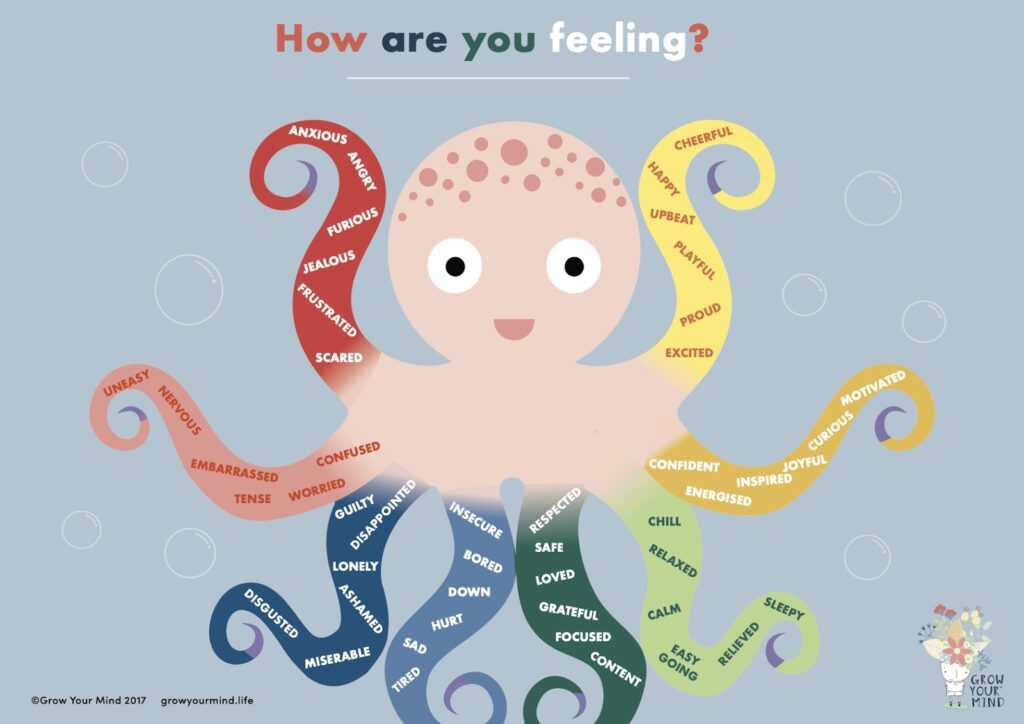
We know that our content alone is not enough
Grow Your Mind is built on a strong evidence-informed foundation: positive psychology, social-emotional learning and neuroscience. But we also know that evidence-based does not always mean effective in real-world classrooms. A school cannot take on Grow Your Mind, teach it a few times a week and expect children to feel resilient and empowered if at the same time there is a culture across the school of high pressure, unkindness and a disconnect between school and home. What truly matters is how the school environment supports or undermines that content. A program that is effective in one school might fail in another if the surrounding context is not supportive.
As Dr Helen Street reminds us, simply delivering research-backed content does not guarantee behaviour change. According to Dr Street: “No program can override a toxic school culture.” We must go further, towards evidence-based best practice. Starting with teacher wellbeing, which at Grow Your Mind is something we communicate is essential before teachers start teaching anything from our online program.
We also know that the conditions for belonging must be at the forefront of delivering any of our content. When every student feels valued and included, conditions are ripe for Grow Your Mind and other wellbeing programs to make a positive difference to their lives.
Part of evidence-based best practice means asking:
Do students want to hear this? We design our content to be playful, engaging and relevant. We use storytelling, humour, metaphor, and animal characters to spark curiosity. We do not impose wellbeing content; we create space for discovery and voice. Children are invited in. They are not passive recipients. They are, at many times, co-creators. We believe that when students feel like their experiences are reflected, and their questions welcomed, they are far more likely to engage.
Does the learning feel achievable? We break big ideas like resilience into concrete, doable steps. Kids can practise reframing, kindness, and conflict repair right away. But not only that , for our content to be achievable we know it must be genuine and relevant to students’ lives. We have such a rich variety of content and we actively encourage teachers to look at their students’ needs and interests. It also means that we encourage schools to embed wellbeing into everyday practices, relationships and routines. Our Grab 5 minutes of wellbeing is a fantastic example of this. 5 minute activities that you can use throughout the day on topics ranging from conversation making, respectful relationships, gender stereotypes, movement and music and so much more.
Does it honour student agency? Best practice from Grow Your Mind to teachers delivering the lessons is to NOT rely on compliance. We help students develop ownership of their learning and wellbeing. They are encouraged to reflect, question and lead. In our podcast, each episode features 5 to 10 children, all of whom help shape the episode content. In our book, every chapter features a real story from a real child. It is not a lecture, it is an invitation.

Is it embedded in school culture? Mental health lessons work best when backed by consistent messages and values across the school community. That is why we support whole-school implementation. It is why we have a road map that highlights the need for staff wellbeing, careful planning as well as flexibility to be responsive to the needs of students. It is also why we encourage schools to form a dedicated and diverse wellbeing team to help deliver the program, not just one poor teacher waving the wellbeing flag! This is the reason we have created professional development on building a positive culture and why we caution schools about adopting a growth mindset blindly.
Schools who use awards for excellence, who only recognise ‘outstanding’ students, who make it unsafe for students to take risks with their learning, to make mistakes – cannot and should not teach growth mindset. We know that if a school takes on Grow Your Mind but has a culture that is stressful, only praises excellence and demands too much of staff and students, the potential benefits of Grow Your Mind will be limited.
Case Studies – from students and children using Grow Your Mind
We hear weekly from students, teachers and leaders about the impact Grow Your Mind is having. Here is a snap shot.
We recently heard from a Year 6 teacher. She shared that in Term 1 she noticed a general slide towards her students feeling disengaged across all classes, including Grow Your Mind. She decided to follow our awe hunting and glimmer seeking module and she noticed a contagion of positivity start to spread. Students were coming back from the playground or the weekend sharing glimmer and awe moments. During camp, deep in a school bushwalk, a student suddenly paused and exclaimed, “Awe. I feel awe.”
At another school we heard about an eleven-year-old standing frozen before a class presentation. But then he remembered his Grow Your Mind lesson on safe scary and quietly asked himself: Is this a threat, a challenge or an opportunity? He chose ‘challenge’ and began.

In one school, a Year 5 teacher shared how after following our respectful relationships module she noticed a change in culture that extended outside of the classroom. The boys in her class began to call out disrespect when they saw it towards girls on the playground. She noticed a greater push towards curiosity and more willingness to work with opposite genders.
OR most recently we heard from the head of wellbeing at St Luke’s about a recent family hike:
“Today I walked Mount Etna with my husband and kids. It was certainly much more challenging than expected. Maybe it was the altitude or maybe my average fitness, but it definitely was not helped by 2 out of 3 kids declaring that they couldn’t do it!
I was on the verge of turning back with the kids but leant on the skills I have learnt from Grow Your Mind – Mental Health Education Social Venture and worked to turn the shark thoughts into dolphin thoughts.
We spoke quiet dolphin words to ourselves – “we can do hard things” and made it to the end. Thank you Grow Your Mind for the small ideas that help make kids (and adults!) more resilient and gritty.”
A final case for wellbeing programs in schools:
If we want to build a positive culture in our schools we need to look at what and how we are teaching. We provide content to schools that is indeed evidence informed but we also provide guidance for best practice in delivery. We believe in stories, strategies, and skills. We do not aim for compliance. We nurture capacity. This is mental health education. Done with evidence. Done with care. Done well.
Learn more: www.growyourmind.life
